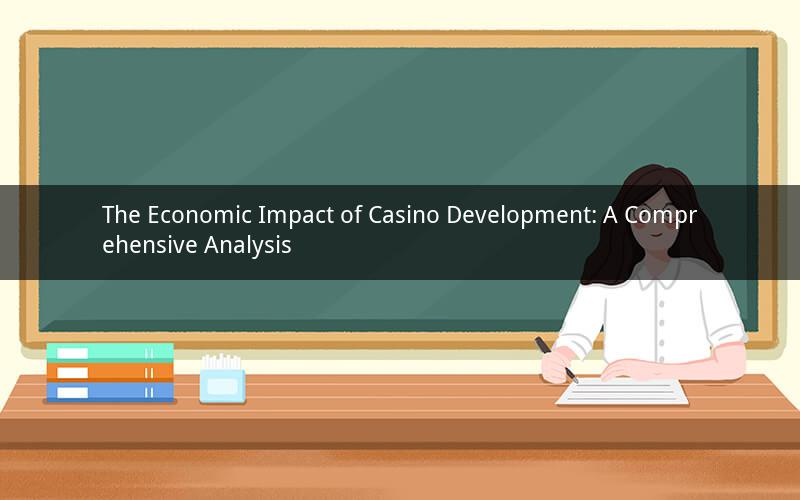
Casino development has become a significant trend in many regions around the world, with governments and investors alike considering it as a potential driver of economic growth. This article delves into the various aspects of casino development and its potential positive effects on economic growth. By examining the benefits, challenges, and long-term implications, we aim to provide a comprehensive understanding of the subject.
I. Economic Benefits of Casino Development
1. Job Creation
One of the most immediate benefits of casino development is the creation of jobs. Casinos require a diverse workforce, including dealers, security personnel, chefs, and administrative staff. Moreover, the construction phase of a casino project generates employment opportunities for engineers, architects, and construction workers.
2. Revenue Generation
Casinos generate substantial revenue through gambling activities, food and beverage services, and entertainment events. This revenue can be used to fund public services, infrastructure improvements, and other government initiatives. Additionally, casinos often contribute to the local tax base, providing a steady stream of income for municipalities.
3. Attraction of Tourists
Casinos are often accompanied by hotels, restaurants, and entertainment venues, making them attractive destinations for tourists. This influx of visitors can boost the local economy, as tourists spend money on accommodations, dining, shopping, and other activities.
4. Spillover Effects
The development of a casino can lead to spillover effects, such as increased investment in nearby businesses and infrastructure. For example, a new casino may encourage the construction of hotels, restaurants, and shopping centers, creating further job opportunities and economic growth.
II. Challenges and Risks of Casino Development
1. Social Costs
Casino development can lead to social costs, such as increased crime rates, gambling addiction, and other negative consequences. These issues can strain local resources and create a burden on public services.
2. Negative Impact on Local Businesses
The presence of a casino can negatively impact local businesses, particularly those in the entertainment and hospitality sectors. Competitors may struggle to maintain their market share, leading to job losses and economic hardship.
3. Environmental Concerns
Casino development can have negative environmental impacts, such as increased traffic congestion, pollution, and the destruction of natural habitats. These issues can lead to long-term economic and social challenges.
III. Long-Term Implications of Casino Development
1. Economic Sustainability
The long-term economic sustainability of casino development is a critical concern. While casinos can provide short-term economic benefits, it is essential to ensure that these benefits are sustainable over time. This may require careful planning and management to mitigate potential risks and maximize the positive impact.
2. Community Impact
The impact of casino development on the local community is another important consideration. It is crucial to assess the social, cultural, and environmental implications of casino development and ensure that the benefits are shared equitably among community members.
3. Regulation and Oversight
Effective regulation and oversight are essential to ensure that casino development is conducted responsibly and that the potential risks are minimized. This includes monitoring for gambling addiction, addressing social costs, and ensuring that the local community benefits from casino development.
Questions and Answers:
1. Q: Can casino development lead to long-term economic growth in a region?
A: Yes, casino development can contribute to long-term economic growth through job creation, revenue generation, and the attraction of tourists. However, it is essential to manage potential risks and ensure that the benefits are shared equitably among community members.
2. Q: Are there any negative social consequences associated with casino development?
A: Yes, casino development can lead to negative social consequences, such as increased crime rates, gambling addiction, and other social issues. These challenges require careful management and regulation to mitigate their impact.
3. Q: How does casino development affect local businesses?
A: Casino development can negatively impact local businesses, particularly those in the entertainment and hospitality sectors. Competitors may struggle to maintain their market share, leading to job losses and economic hardship. However, casinos can also generate spillover effects that benefit nearby businesses.
4. Q: What is the role of regulation in casino development?
A: Regulation plays a crucial role in casino development by ensuring that the industry is conducted responsibly and that potential risks are minimized. This includes monitoring for gambling addiction, addressing social costs, and ensuring that the local community benefits from casino development.
5. Q: How can a region maximize the economic benefits of casino development?
A: To maximize the economic benefits of casino development, a region should carefully plan and manage the project, ensuring that it generates jobs, revenue, and tourism. It is also essential to address potential risks and challenges, such as social costs and negative impacts on local businesses. Effective regulation and oversight are key to achieving these goals.